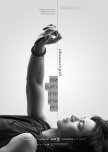Heartbreakingly beautiful or beautifully heartbreaking
The series is a masterpiece. Considering the fact that it so extremely focused on conversations between the characters, one would expect to be bored easily. But the reality is different. I was kept on the edge of my seat through most of the conversations, especially when Wang finally let out everything he was feeling.
The pace seems both slow and fast at the same time, but it is not something that bothered me. I actually think it fits the storyline very nicely. I really loved how nicely different metaphors were put into the dialogue. And even into the scenes themselves. The lines, the bridge, the divider in In’s room. They all made so much sense in relation to the story, the emotions and relations between the characters.
Death of a parent, or another loved one, is always hard. What we have in the series is three people who loved the same man (in different was) and are still mourning his loss. Each in their own way, but they are all still hurting, and there is so much left unsaid between them.
Sasiwimol, Wang’s mom, is a character I really wanted to hate. She comes across as someone who is very prejudiced towards LGBTQ+ community, who abandoned her child when he needed her most, and as someone who doesn’t really know how to be a mom but prefers to be a friend. But towards the end, we get to see just how much she really cares for Wang. She might not be the best mother out there and is quite manipulative, she still cares for Wang deep inside. She wants him to live a life of no pain, of happiness, something she didn’t necessarily have.
Inthawut, the 52-hertz whale, still feels incredible amounts of guilt for what has happened in the past. While there are certain parts of the story between In, Mol and Siam (Wang’s father) that are still unclear, his pain is. He hid himself away from his friends and most society, hoping to fix things that he didn’t even cause. He, I think, sees his loneliness as something he deserves for what has happened in the past.
Wang is lost. Not geographically, but definitely philosophically. He is unsure about who he is as he feels a big part of him was lost with his father’s death. His mom is not someone he can always have an honest conversation with as the two end up arguing. But he finds someone willing to talk in In. I don’t know if Wang’s love is actually real or if he is just interpreting it as such, but that is not really the main aspect of the series. It’s actually Wang’s journey of self-discovery. He learns a lot about his father, about his mother and about In, which in turn helps him learn a lot more about himself as well.
I expected the ending we got, and I think it was the right one. It doesn’t mean it wasn’t heartbreakingly beautiful. Wang had to completely break himself down before he was able to build himself up again. The same is true for In and even Mol. The three of them really went through a roller coaster of emotions.
The pace seems both slow and fast at the same time, but it is not something that bothered me. I actually think it fits the storyline very nicely. I really loved how nicely different metaphors were put into the dialogue. And even into the scenes themselves. The lines, the bridge, the divider in In’s room. They all made so much sense in relation to the story, the emotions and relations between the characters.
Death of a parent, or another loved one, is always hard. What we have in the series is three people who loved the same man (in different was) and are still mourning his loss. Each in their own way, but they are all still hurting, and there is so much left unsaid between them.
Sasiwimol, Wang’s mom, is a character I really wanted to hate. She comes across as someone who is very prejudiced towards LGBTQ+ community, who abandoned her child when he needed her most, and as someone who doesn’t really know how to be a mom but prefers to be a friend. But towards the end, we get to see just how much she really cares for Wang. She might not be the best mother out there and is quite manipulative, she still cares for Wang deep inside. She wants him to live a life of no pain, of happiness, something she didn’t necessarily have.
Inthawut, the 52-hertz whale, still feels incredible amounts of guilt for what has happened in the past. While there are certain parts of the story between In, Mol and Siam (Wang’s father) that are still unclear, his pain is. He hid himself away from his friends and most society, hoping to fix things that he didn’t even cause. He, I think, sees his loneliness as something he deserves for what has happened in the past.
Wang is lost. Not geographically, but definitely philosophically. He is unsure about who he is as he feels a big part of him was lost with his father’s death. His mom is not someone he can always have an honest conversation with as the two end up arguing. But he finds someone willing to talk in In. I don’t know if Wang’s love is actually real or if he is just interpreting it as such, but that is not really the main aspect of the series. It’s actually Wang’s journey of self-discovery. He learns a lot about his father, about his mother and about In, which in turn helps him learn a lot more about himself as well.
I expected the ending we got, and I think it was the right one. It doesn’t mean it wasn’t heartbreakingly beautiful. Wang had to completely break himself down before he was able to build himself up again. The same is true for In and even Mol. The three of them really went through a roller coaster of emotions.
Vond je deze recentie nuttig?


 2
2 5
5






















